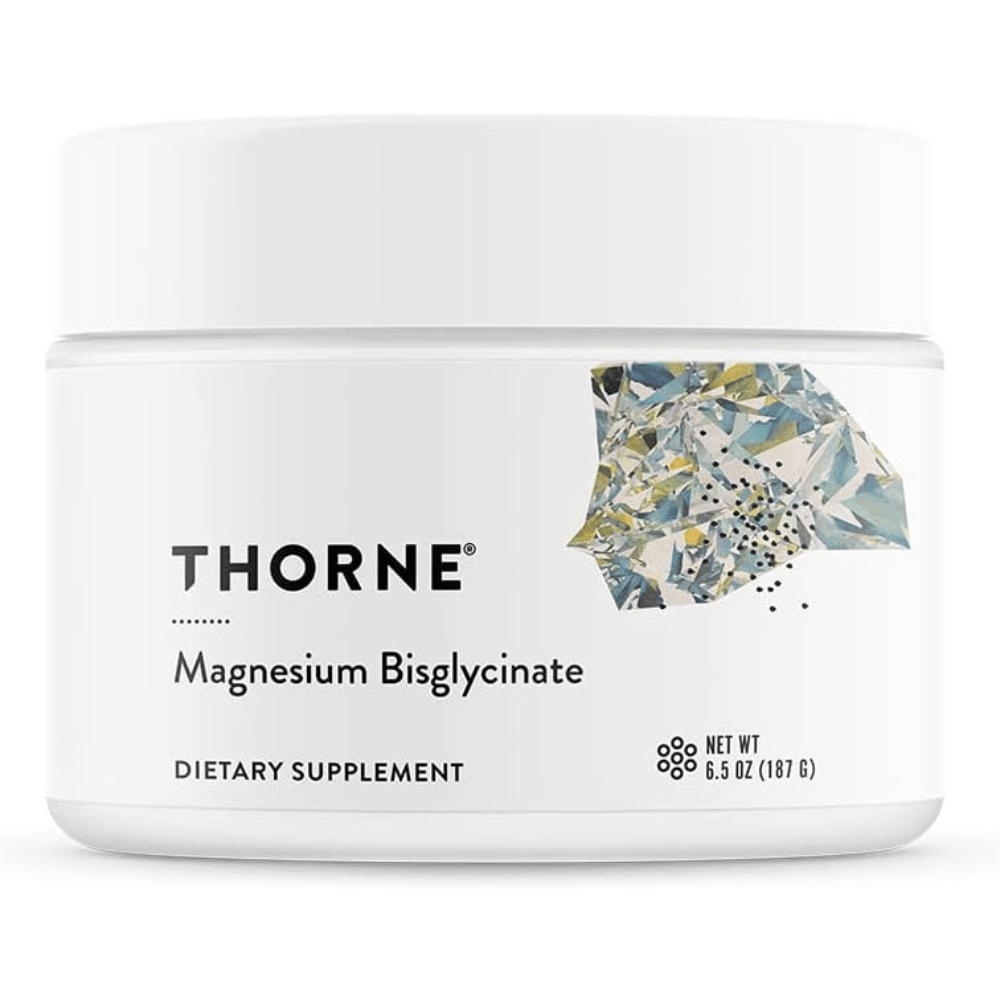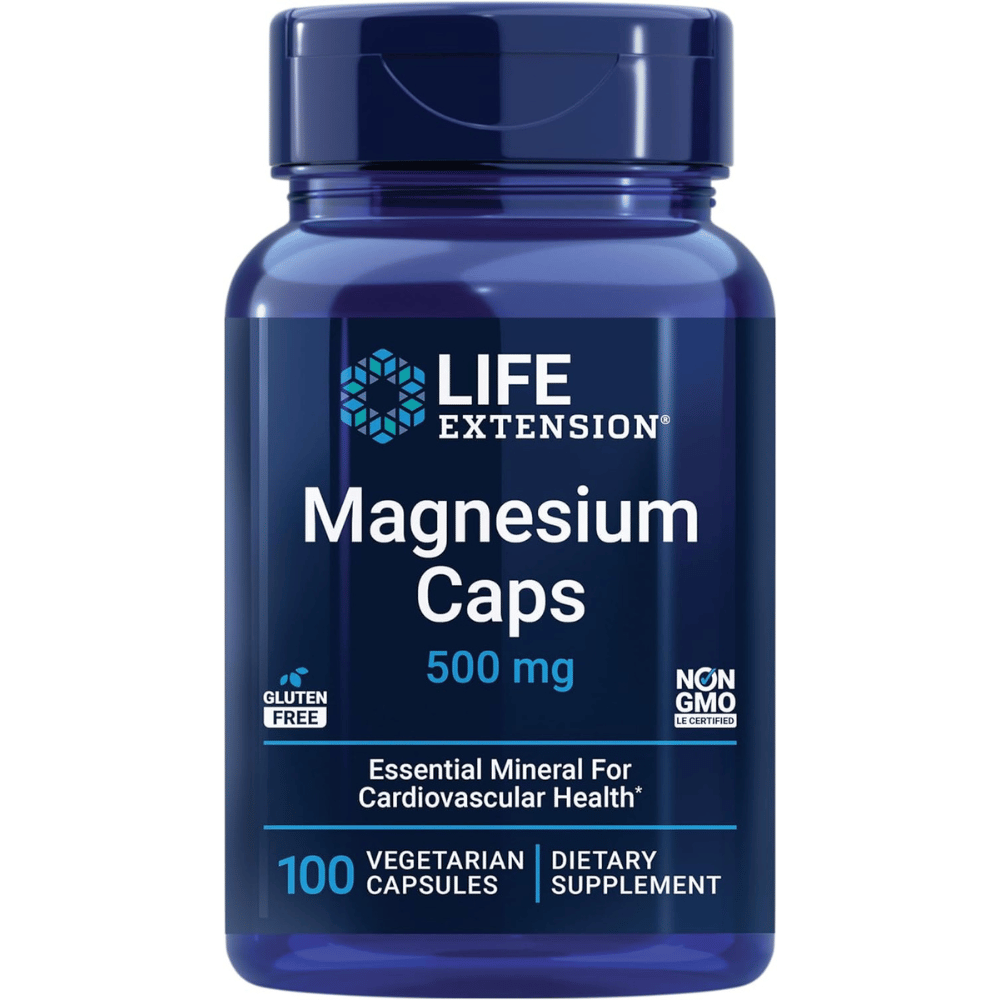Key Takeaways:
- Identifying the best magnesium supplement for muscle health involves understanding the different forms of magnesium and their specific benefits.
- Magnesium plays a crucial role in muscle and nerve function, and the right supplement can aid in muscle relaxation, energy production, and relieving muscle cramps.
- Consultation with a healthcare professional is recommended to determine the appropriate magnesium supplementation for individual health needs.
Magnesium is an essential mineral that is vital for numerous physiological processes, including muscle function, nerve function, energy metabolism, and bone health. For those looking to support their muscle health, finding the best magnesium supplement is key. This comprehensive review will delve into the various forms of magnesium and their benefits for muscles, helping you make an informed decision on which supplement is right for you.
Understanding Magnesium and Muscle Health
Magnesium is a vital mineral that is crucial for muscle contraction, relaxation, and overall muscle health. A magnesium deficiency can lead to muscle weakness, cramps, and other muscular issues. Ensuring you have enough magnesium through diet or supplementation can help maintain optimal muscle function.
The Role of Magnesium in Muscle Function
Magnesium plays a pivotal role in over 300 enzymatic reactions in the body, many of which are related to muscle function and energy production. It helps in the conversion of food into energy, aids in the synthesis of protein, and regulates neurotransmitters that send signals throughout the nervous system and muscles.
Different Forms of Magnesium Supplements
When it comes to magnesium supplements, not all forms are created equal. Each type of magnesium has different properties and benefits that may be more suitable for muscle health.
Magnesium Oxide: A Common Choice
Magnesium oxide is a popular form of magnesium supplement due to its high magnesium content per serving. However, it is not as easily absorbed by the body compared to other forms, which may limit its effectiveness for muscle health.
Magnesium Citrate: Absorption and Bioavailability
Magnesium citrate is known for its good absorption rate and is often used for its laxative effects. It combines magnesium with citric acid, which may be beneficial for those with digestive system issues.
Magnesium Glycinate: The Muscle Relaxer
Magnesium glycinate is a chelated form of magnesium that is bound to the amino acid glycine. This form is highly bioavailable and is less likely to cause an upset stomach. It is particularly effective for muscle relaxation and may improve sleep quality.
Magnesium Malate: Energy and Muscle Soreness
Magnesium malate includes magnesium and malic acid, a compound involved in the Krebs cycle for energy production. This form is often recommended for those experiencing muscle soreness and fatigue.
Magnesium Chloride: Topical and Oral Use
Magnesium chloride can be used both topically and orally. It is easily absorbed through the skin, making it a good option for those who prefer not to take oral supplements. It can also aid in muscle health when ingested.
Magnesium Taurate: For Heart and Muscle Health
Magnesium taurate combines magnesium with taurine, an amino acid that supports heart health. This form is often chosen for its potential benefits to both the heart and muscles.
Magnesium L-Threonate: Brain Health and Beyond
Magnesium L-threonate is praised for its ability to cross the blood-brain barrier, potentially benefiting brain health. While not the most common choice for muscle health, it may offer overall health benefits.
Magnesium Sulfate: Beyond Epsom Salts
Commonly known as Epsom salts, magnesium sulfate is frequently used in baths to relieve muscle cramps and soreness. However, its effectiveness as an oral supplement for muscle health is less clear.
Magnesium Carbonate: The Antacid Property
Magnesium carbonate has antacid properties and can be converted to magnesium chloride in the stomach, but it may not be the most efficient form for muscle health due to its lower bioavailability.
Trace Minerals Magnesium Gummies: A Tasty Alternative
For those who struggle with pills, trace minerals magnesium gummies offer a palatable alternative. They can provide an adequate magnesium dose in a form that's enjoyable to take.
Other Magnesium Supplements: Exploring the Options
There are other magnesium supplements available, each with unique properties. It's important to explore these options to find the one that best suits your muscle health needs.
How Much Magnesium Do You Need?
The recommended dietary allowance (RDA) for magnesium varies by age, sex, and life stage. Generally, adult men need 400-420 mg per day, while adult women require 310-320 mg per day.
Signs of Magnesium Deficiency
Symptoms of magnesium deficiency can include muscle cramps, fatigue, and irregular heartbeat. If you suspect a deficiency, it's crucial to consult a healthcare professional before starting supplementation.
The Importance of Magnesium-Rich Foods
While supplements are beneficial, incorporating magnesium-rich foods into your diet is also important. Foods like leafy greens, nuts, seeds, and whole grains are excellent sources of magnesium.
When to Take Magnesium Supplements
The timing of magnesium supplementation can affect its benefits. Taking magnesium in the evening may support muscle relaxation and restful sleep, while morning doses can aid in energy production.
Potential Side Effects of Too Much Magnesium
Excess magnesium from supplements can lead to digestive issues and an imbalance of other minerals. It's important to stick to the recommended dosage and consult a healthcare professional if you experience any adverse effects.
Interactions with Other Medications
Magnesium can interact with certain medications, such as diuretics and antibiotics. Always discuss with a healthcare professional before starting any new supplement regimen.
Magnesium Supplementation Strategies for Athletes
Athletes often require more magnesium per serving due to their increased physical activity, which can deplete magnesium levels more rapidly. The best magnesium supplements for athletes are those that offer high bioavailability and rapid magnesium absorption to replenish what is lost during intense workouts. This is crucial for preventing leg cramps and optimizing muscle function. Athletes should look for supplements that contain a magnesium form that is easily absorbed, such as magnesium citrate or magnesium bisglycinate, to ensure they are getting the most out of their supplementation.
In addition to supplementation, athletes should focus on magnesium-rich foods to maintain adequate magnesium intake. Foods such as dark leafy greens, nuts, seeds, and whole grains are excellent sources of dietary magnesium. Integrating these foods into their diet can help athletes maintain their magnesium levels naturally. However, when dietary sources are not enough, incorporating a well-formulated magnesium supplement can make a significant difference in an athlete's performance and recovery.
Magnesium Supplementation and Cognitive Function
Magnesium L-threonate, a relatively new form of magnesium supplement, has been gaining attention for its potential benefits on cognitive function. Studies suggest that this particular type of magnesium may be more effective in crossing the blood-brain barrier, which could enhance its neuroprotective benefits. The implications for memory enhancement, learning, and overall brain health are significant, making magnesium L-threonate a standout in the realm of cognitive dietary supplements.
While research is still in its early stages, the potential of magnesium L-threonate to mitigate the effects of cognitive decline has sparked interest in the scientific community. This form of magnesium could be particularly beneficial for aging populations looking to preserve mental acuity. As a dietary supplement, magnesium L-threonate could complement a regimen aimed at maintaining cognitive health, alongside other lifestyle choices such as engaging in mental exercises and consuming magnesium-rich foods.
The Diversity of Magnesium Supplements in the Market
When exploring the types of magnesium available, consumers are often surprised by the variety. Each type of magnesium—oxide, citrate, glycinate, malate, chloride, taurate, L-threonate, sulfate, and carbonate—offers unique benefits and absorption rates. This diversity allows individuals to tailor their magnesium intake to their specific health needs, whether it's for muscle health, digestive support, or cognitive function. Understanding the nuances between these types can help consumers make informed decisions about their dietary supplement choices.
Magnesium-rich foods are a vital component of a balanced diet, but for those who need an extra boost, supplements can play a crucial role. The body's ability to absorb magnesium varies based on the form ingested, and factors such as individual health conditions and lifestyle can influence the effectiveness of each type of magnesium. As a result, the market offers a wide range of supplements to ensure that everyone can find a suitable option to complement their diet and support their overall health.
Magnesium-Rich Foods: The Natural Complement to Supplements
When discussing the best sources of magnesium, it's essential to highlight magnesium-rich foods as a natural complement to supplements. These foods not only provide magnesium in a bioavailable form but also offer a symphony of other nutrients that work in harmony with magnesium to enhance muscle health and overall well-being. Leafy greens like spinach and Swiss chard, seeds such as pumpkin and chia, nuts like almonds and cashews, and whole grains including quinoa and brown rice are powerhouses of magnesium. Incorporating these foods into your diet can significantly contribute to your daily magnesium intake and support muscle function.
Moreover, the benefits of consuming magnesium-rich foods extend beyond muscle health. They contribute to a balanced diet that can improve various aspects of health, such as heart function, bone density, and metabolic processes. For those looking to boost their magnesium levels naturally, it's advisable to focus on these nutrient-dense foods. They can be especially beneficial for individuals who may have dietary restrictions or prefer to obtain their nutrients from whole food sources rather than supplements. Remember, while supplements like magnesium l-threonate are effective, they should ideally complement a diet rich in natural magnesium sources.
Magnesium L-Threonate: A Focused Approach to Cognitive and Muscular Health
Magnesium l-threonate has garnered attention for its unique ability to cross the blood-brain barrier, making it a particularly effective form of magnesium for cognitive function. This compound, which is the result of magnesium being chelated to threonic acid, a metabolite of vitamin C, has been shown to support brain health and may enhance learning and memory. For those specifically looking to improve cognitive aspects alongside muscle health, magnesium l-threonate presents a compelling option. Its targeted action on the brain sets it apart from other forms of magnesium supplements, which may not have the same level of impact on cognitive processes.
In addition to its cognitive benefits, magnesium l-threonate is also beneficial for muscles. It supports the nervous system's role in muscle contraction and relaxation, which is crucial for muscle health and function. The dual action of magnesium l-threonate on both the brain and muscles makes it an attractive supplement for those seeking a holistic approach to health. While research is ongoing, current studies suggest that magnesium l-threonate could be particularly useful for aging populations, athletes, or individuals with cognitive concerns who also understand the importance of maintaining muscle health.
Magnesium's Role in Athletic Performance and Recovery
Athletes are constantly seeking ways to enhance performance and accelerate recovery. Magnesium plays a pivotal role in both arenas, making it a mineral of high interest for those in the sports field. Adequate magnesium levels are essential for muscle contraction, relaxation, and protein synthesis—all vital components of athletic performance. Studies have shown that magnesium can improve strength, power, and endurance in athletes. Moreover, it aids in the management of lactate levels, which can accumulate during exercise and lead to muscle fatigue.
The recovery phase is just as crucial as the performance itself for athletes. Magnesium's anti-inflammatory properties can help reduce muscle soreness and inflammation post-exercise. Additionally, magnesium-rich foods and supplements, such as magnesium l threonate, can play a significant role in replenishing depleted magnesium stores after intense workouts. This not only helps in muscle repair but also prepares the body for the next round of physical activity, potentially reducing the risk of injury and improving overall athletic longevity.
Magnesium L-Threonate's Unique Advantages for Athletes
Magnesium l threonate, in particular, has garnered attention for its unique ability to cross the blood-brain barrier, potentially enhancing cognitive functions that are beneficial for athletes. Mental clarity, focus, and the ability to react quickly to dynamic situations are enhanced when the brain is functioning optimally. These cognitive aspects are critical in sports, where split-second decisions can be the difference between victory and defeat. Magnesium l threonate supplements may offer athletes an edge by supporting brain health and cognitive processes.
Furthermore, the use of magnesium l threonate extends beyond cognitive support; it also contributes to better sleep quality—a key component of an athlete's recovery process. Quality sleep is associated with improved muscle recovery, better performance, and reduced risk of injury. By incorporating magnesium l threonate into their nutrition regimen, athletes can benefit from its systemic effects, not only aiding in muscle function and cognitive performance but also in achieving restorative sleep, thus supporting an all-encompassing approach to athletic health and performance.
Magnesium does not work in isolation within the body; it interacts synergistically with other nutrients to enhance overall health. For instance, magnesium form and vitamin D work together to support bone health, with magnesium playing a pivotal role in the conversion of vitamin D into its active form. This interplay is essential for calcium absorption and maintaining strong bones. Therefore, individuals looking to improve their bone health should consider both their magnesium intake and vitamin D levels.
Moreover, the best magnesium supplements often include complementary nutrients like B vitamins, which can aid in magnesium absorption and enhance its benefits for the nervous system and energy production. Magnesium L-threonate, in particular, is recognized for its ability to cross the blood-brain barrier, potentially improving cognitive functions when paired with a B-complex vitamin. When selecting dietary supplements, it's beneficial to consider products that offer these synergistic combinations to maximize the health benefits of magnesium.
The Benefits of Liquid Form Magnesium
Liquid-form magnesium supplements can offer faster absorption and may be easier for some people to take. They can be a good option for those who have difficulty with pills or powders.
Magnesium and High Blood Pressure
Some forms of magnesium, such as magnesium citrate, have been shown to help lower high blood pressure, which can be beneficial for overall cardiovascular health.
Magnesium for Relieving Muscle Cramps
Magnesium supplements can be effective in relieving muscle cramps, with forms like magnesium glycinate and magnesium chloride often recommended for this purpose.
Magnesium and Muscle Soreness
Supplemental magnesium may help reduce muscle soreness after exercise, with magnesium malate being a popular choice for athletes and active individuals.
The Role of Magnesium in Energy Production
Magnesium is essential for energy production at the cellular level. Supplements can help ensure that your body has enough magnesium to support this vital function.
Magnesium for Muscle Relaxation
Magnesium's ability to help with muscle relaxation is one of its most well-known benefits. This can lead to improved sleep quality and reduced muscle tension.
The Impact of Magnesium on the Nervous System
Magnesium's role in regulating neurotransmitters is crucial for the nervous system's function, which in turn affects muscle health and coordination.
Magnesium and Bone Health
While not directly related to muscles, magnesium's role in bone health is important as strong bones support muscle function and overall mobility.
Magnesium for Heart Health
Magnesium's benefits extend to heart health, where it helps maintain normal heart rhythms and can prevent muscle spasms in the heart's blood vessels.
Magnesium and Blood Sugar Control
Magnesium plays a role in blood sugar control, which is important for overall health and can indirectly affect muscle function.
The Connection Between Magnesium and Sleep Quality
Good sleep is essential for muscle recovery, and magnesium supplements, particularly magnesium glycinate, can improve sleep quality.
How to Identify a High-Quality Magnesium Supplement
When choosing a magnesium supplement, look for third-party testing, manufacturing certifications, and transparency in ingredient sourcing.
The Cost-Effectiveness of Magnesium Supplements
While price shouldn't be the only factor, it's important to consider the cost-effectiveness of a magnesium supplement. Higher absorption rates can mean better value.
Personal Experiences with Magnesium Supplementation
Anecdotal evidence and personal experiences can provide insight into the effectiveness of different magnesium supplements for muscle health.
Case Studies on Magnesium and Muscle Health
Clinical studies and research can offer valuable information on how magnesium supplementation impacts muscle health and function.
5 Magnificent Magnesium Supplements to Soothe Your Muscles and Boost Your Workouts
We've curated a list of the top magnesium supplements that are perfect for anyone looking to improve muscle function, enhance recovery, and support overall health. Get ready to give your muscles the love they deserve!
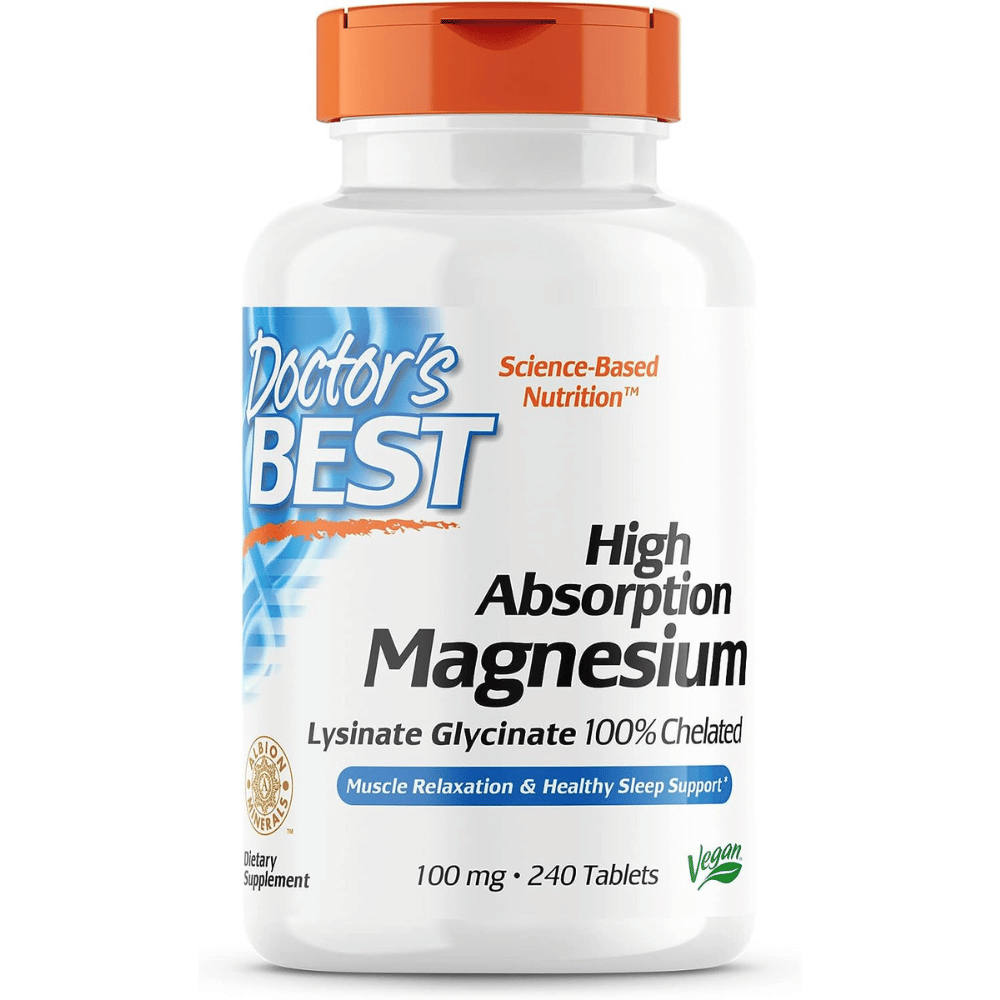
Doctor's Best High Absorption Magnesium
Vegan, Non-GMO, Gluten-Free, and Soy-Free.
Doctor's Best brings you a magnesium supplement that's designed for maximum absorption. Say goodbye to gastrointestinal discomfort and hello to muscle relaxation and recovery.
Key Benefits:
- Utilizes a chelated form of magnesium for enhanced absorption and bioavailability.
- Helps support bone density, muscle relaxation, and cardiovascular health.
- Non-GMO, soy-free, and vegan-friendly, catering to a wide range of dietary needs.
Customer Review:
"After starting Doctor's Best Magnesium, my post-workout recovery has improved dramatically. No more leg cramps at night, and I feel like my muscles are less tense throughout the day."
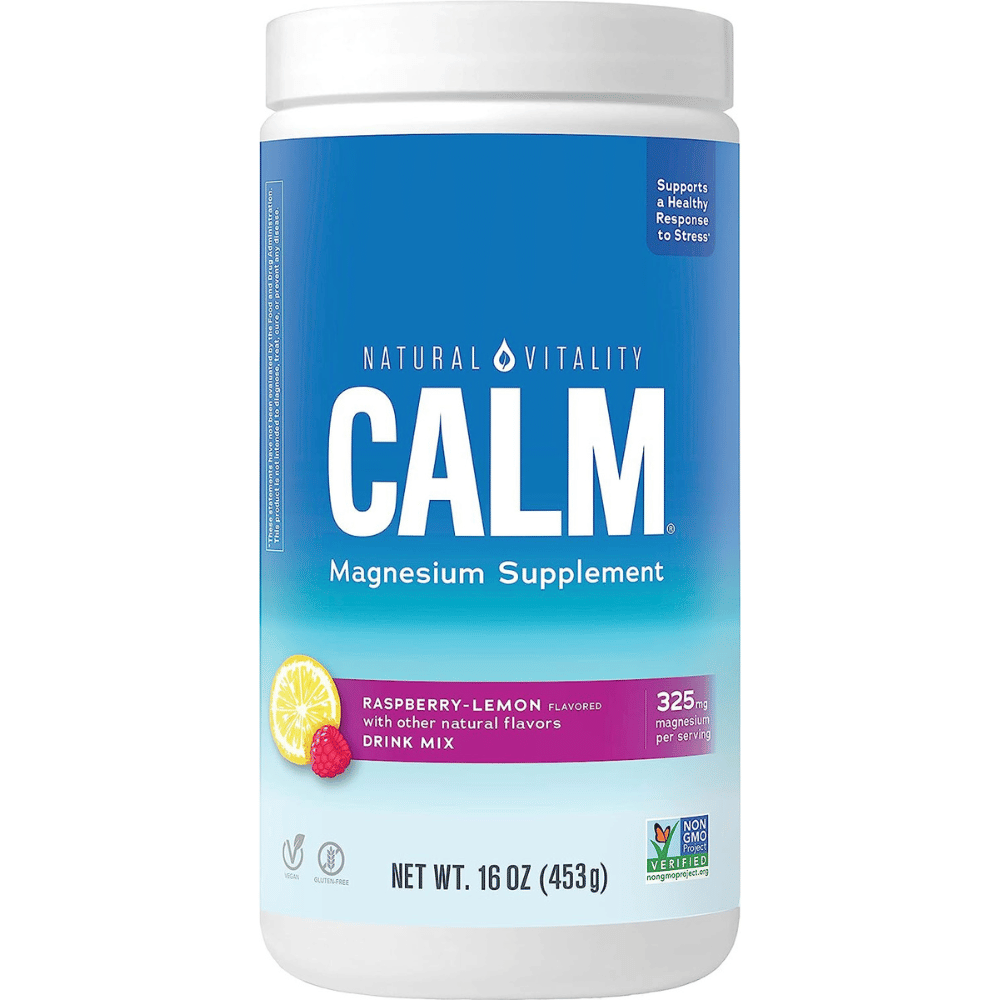
Natural Vitality Calm Magnesium Citrate Supplement
Contains 325 mg of magnesium per serving.
Natural Vitality's Calm Magnesium Powder is a unique, stress-relieving supplement that promotes muscle health and relaxation. Its easy-to-mix powder form makes it a convenient addition to your daily routine.
Key Benefits:
- Features a highly absorbable, water-soluble magnesium in ionic form.
- Helps balance calcium intake and supports healthy magnesium levels.
- Comes in a variety of flavors, making it a tasty way to unwind and nourish your muscles.
Customer Review:
"I love winding down with Natural Vitality's Calm drink after a long day. It's helped with my muscle soreness and also seems to improve my sleep quality."
Thorne Research is known for its high-quality supplements, and its Magnesium Bisglycinate Powder is no exception. It's specially formulated for easy absorption and minimal laxative effect.
Key Benefits:
- Provides a gentle form of magnesium that's less likely to cause digestive upset.
- Supports muscle recovery, sleep, and metabolic functions.
- Free of gluten, dairy, and soy, making it a great choice for those with sensitivities.
Customer Review:
"Thorne's Magnesium Bisglycinate has been a game-changer for my training. I've noticed less muscle fatigue and better sleep since I started taking it."
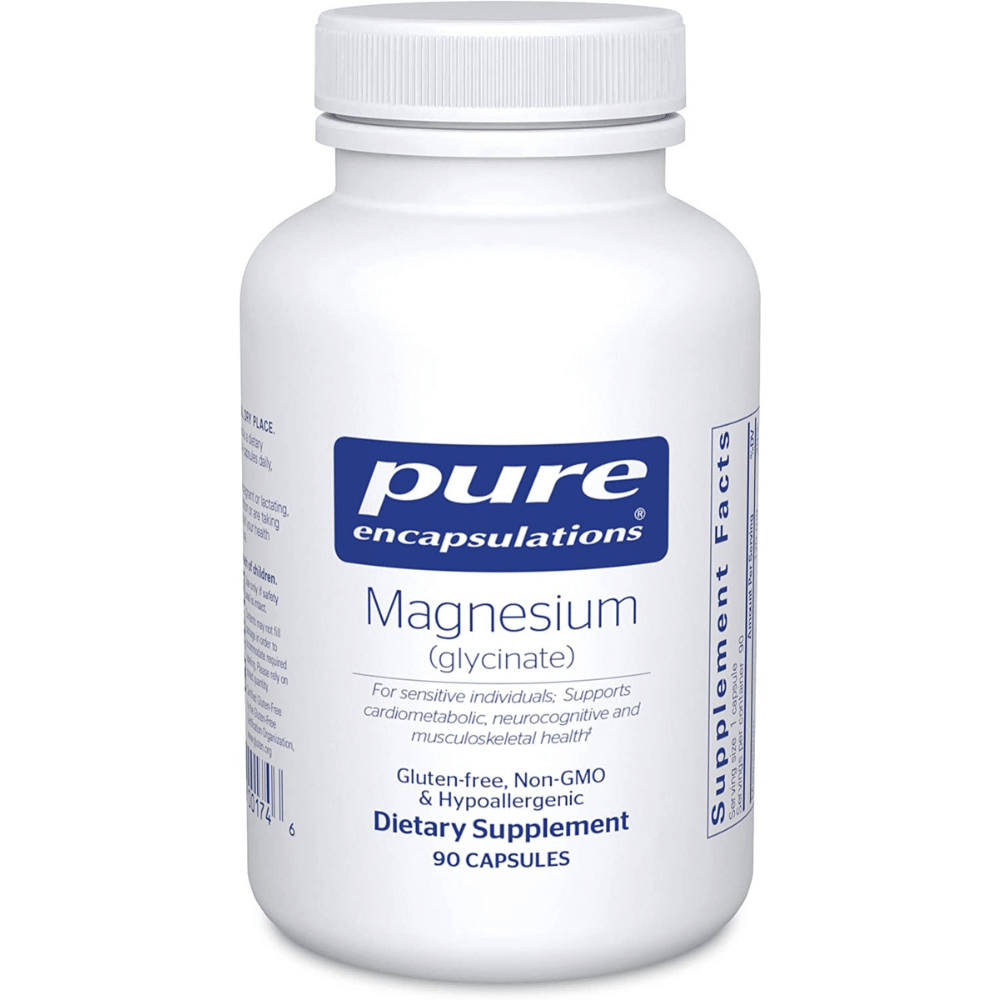
Pure Encapsulations Magnesium (Glycinate)
Free from common allergens, artificial or unnecessary ingredients, and GMOs.
Encapsulations offer a hypoallergenic magnesium glycinate supplement that's highly bioavailable and gentle on the stomach, perfect for maintaining optimal muscle function.
Key Benefits:
- Made with ingredients sourced for their purity and potency.
- Supports energy production, muscle function, and mood balance.
- Free from wheat, eggs, tree nuts, and artificial colors, flavors, and sweeteners.
Customer Review:
"I switched to Pure Encapsulations because other magnesium supplements upset my stomach. This one is so gentle, and I can tell it's helping with my muscle tightness."
Life Extension offers a comprehensive magnesium supplement that combines four different forms of magnesium to support various bodily functions, including muscle health.
Key Benefits:
- Combines magnesium oxide, citrate, succinate, and glycinate.
- Encourages healthy muscle function, cardiovascular health, and nervous system support.
- Each capsule provides 500 mg of magnesium, making it easy to meet your daily needs.
Customer Review:
"I appreciate the blend of magnesium types in Life Extension's supplement. It's like a multi-tool for my body, supporting everything from my heart to my muscles."
Summary
Magnesium is an essential mineral that plays a critical role in muscle and nerve function, energy production, and overall health. The best magnesium supplement for muscles depends on individual health needs, absorption rates, and potential side effects. Forms like magnesium glycinate, malate, and citrate are often recommended for their high bioavailability and specific benefits for muscle health. It's essential to consult with a healthcare professional before starting any supplementation and to consider incorporating magnesium-rich foods into your diet. By understanding the different forms of magnesium and their effects, you can choose a suitable magnesium supplement to support your muscle health and overall well-being.
FAQ Section
Q: What is the best form of magnesium for muscle cramps? A: Magnesium glycinate and magnesium chloride are often recommended for relieving muscle cramps due to their high absorption rates and muscle-relaxing properties.
Q: Can taking magnesium supplements improve exercise performance? A: Yes, magnesium supplements can improve exercise performance by aiding in energy production, reducing muscle soreness, and supporting muscle function.
Q: How do I know if I'm getting enough magnesium from my diet? A: To determine if you're getting enough magnesium from your diet, consider tracking your intake of magnesium-rich foods. If you experience symptoms of magnesium deficiency, such as muscle cramps or fatigue, consult a healthcare professional for advice on supplementation.


